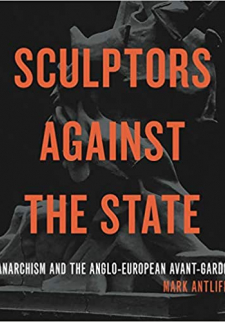Penn State University Press

Sculptors Against the State considers the relation of anarchist ideology to avant-garde sculpture through an examination of three iconic artists whose work transformed European modernism: Umberto Boccioni, Jacob Epstein, and Henri Gaudier-Brzeska. Addressing such complex subjects as sexual liberation, homosexuality, the history of emotions, the ethics of violence, and tactics of nonviolent resistance, Mark Antliff demonstrates how sculptural processes were shaped by forms of anarchism calculated to foster a radical community.
The anarchist view that the State is a state of mind and a set of social relationships is a central theme Antliff uses to explore not only the art of Boccioni, Epstein, and Gaudier-Brzeska but the associated aesthetics of radical luminaries such as Oscar Wilde, F. T. Marinetti, and Ezra Pound. Taking Boccioni’s Unique Forms of Continuity in Space, Epstein’s Tomb of Oscar Wilde, and Gaudier-Brzeska’s Hieratic Head of Ezra Pound as a starting point, Antliff argues that these sculptors saw the arts as a radical catalyst for an entirely new constellation of interpersonal relations and psychological dispositions―ones antithetical to those propagated by the State.
Powerfully argued and informed by extensive archival research, Sculptors Against the State provides a new understanding of these artists, even as it sheds light on why contemporary anarchist theory is necessary for understanding the profound cultural impact modernism had during the twentieth century. Antliff’s work will be of interest to students and scholars of modernist art and literature, and particularly those who study the intersections between artistic practice and politics.